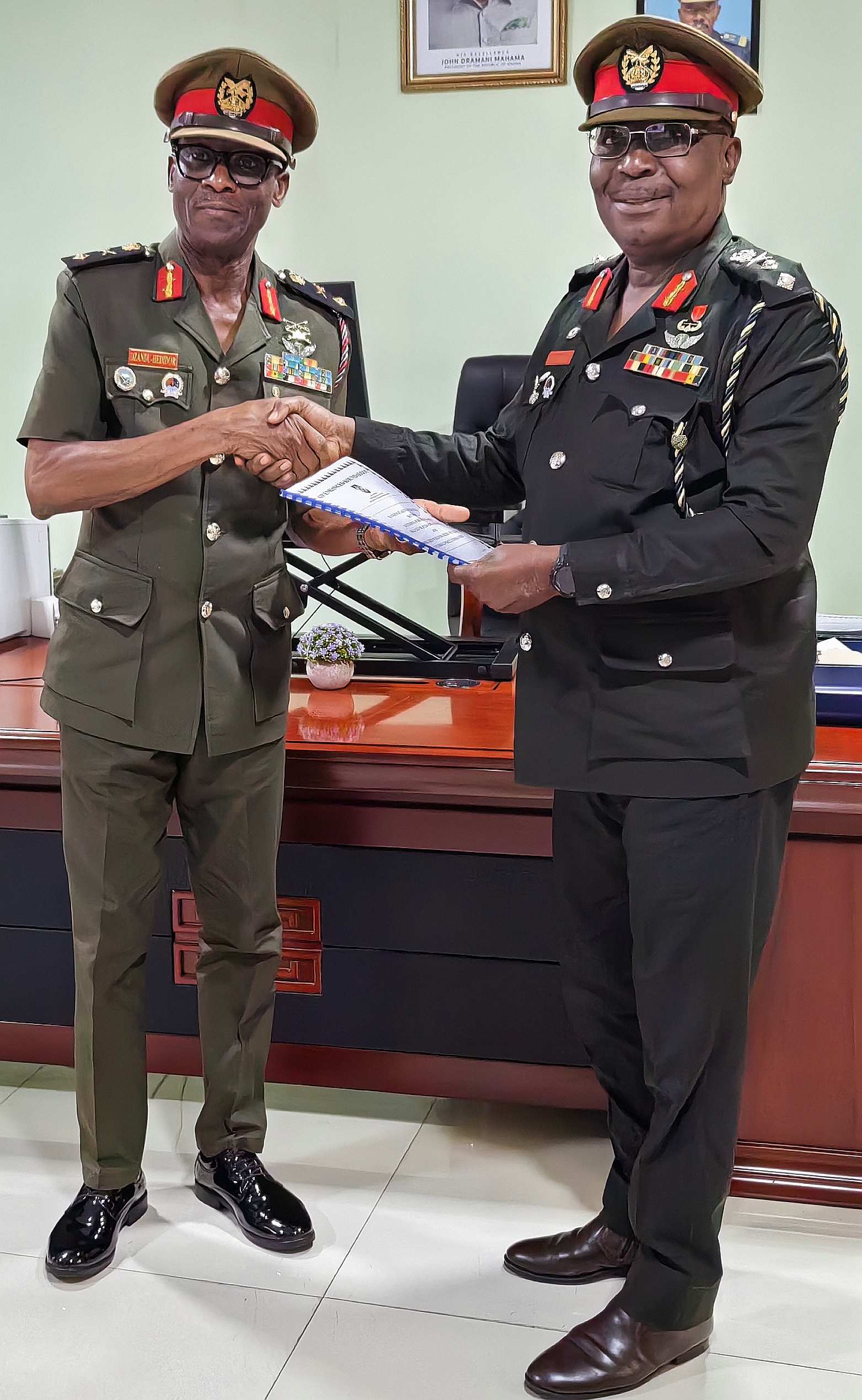The Force Commander (FC), Multi-National Joint Task Force (MNJTF) of the Accra Initiative (AI) – Major General (Maj Gen) Michael Amoah-Ayisi, has handed over to Brigadier General (Brig Gen) Winfred Dzandu-Heddidor of the Ghana Armed Forces (GAF).
The handing over, which was done on Thursday 5 June 2025 at Burma Camp, Accra, also signified Maj Gen M Amoah-Ayisi’s grounding of arms, after 40 years of service with the Ghana Colours – 38 years as a Commissioned Officer.

He expressed gratitude to all stakeholders of the Initiative, such as the African Union (AU), the Economic Community of West African States (ECOWAS), as well as the Chief of Defence Staff (CDS), Nigeria Armed Forces, GAF, and the Africa Centre for Strategic Studies, for contributing to ensure that terrorism does not cover the entire West Africa.
General Amoah-Ayisi’s military career has seen quite a number of notorious conflicts, such as the Liberian conflict in 1990/91; the Sierra Leonean strife in 1991; the Rwanda genocide in 1994/95; the Israeli-Lebanon conflict; several operations on the strife in the Democratic Republic of Congo (DRC) in 2003, and then in 2006/7.
Maj Gen M Amoah-Ayisi (Rtd) became the FC of the MNJTF of AI in November 2023, and completed the setting up and establishment of the MNJTF Headquarters, at Nyohini, in Tamale, Ghana, and equipped it onto operationalization.
His tenure’s achievements include; sharing of intelligence and information among Member States to aid operations; holding many workshop and capacity building activities for Staff Officers and other important personalities, to help planning and coordination.
The MNJTF also built personnel’s capacities to counter terrorism menaces, towards eradicating threats of all forms, in the West Africa sub-region.
Although faced with several teething challenges, the MNJTF was able to organize four ad-hoc actions under Operation KOUNDANLGOU, however, the established Permanent MNJTF is yet to embark on any joint operations.
Per its concept of operations, the MNJTF is still operating in Phase I, which requires Member States to use their troops pledged to the Initiative, to conduct shaping-up operations to stop the spread of terrorism within their various countries.
The Phase I then evolves into Phase II, where operations, such as hot-pursuit cross-border tasks to defeat the threat, are undertaken.
The AI – established in September 2017 – is a West African sub-regional security and intelligence cooperation mechanism, primarily focused on countering terrorism and organized crime in West Africa and the Sahel region, involving a multi-state effort centered on intelligence sharing, training, and joint operations.

The initiative’s core members include Benin, Burkina Faso, Côte d’Ivoire, Ghana, Mali, Togo, and and Niger, while Nigeria participates as an observer.
After a Heads of West African States and Governments Summit on the AI was held in Accra on 22 November 2022, there have been meetings held at the levels of heads of security, intelligence services, and government ministers in charge of security, resulting in a couple of Operation Koundanlgou actions.
Koudanlgou I was conducted in May 2018 jointly by Benin, Burkina Faso, Ghana, and Togo, yielding the arrest of 52 individuals in Burkina Faso, 42 in Benin, 95 in Togo and 13 in Ghana; whereas Koudanlgou II in November 2018 by Burkina Faso, Ghana and Cote d’Ivoire, arrested 16 elements of Islamic State for the Greater Sahara (ISGS), and 8 others.
Koudanlgou III and IV were conducted simultaneously in six countries, leading to arrest of 386 people in the five northern regions of Ghana, and seizures of weapons, materials including weapons, narcotic drugs, mining implements, contraband goods and vehicles.
By Kofi Ampeah-Woode
